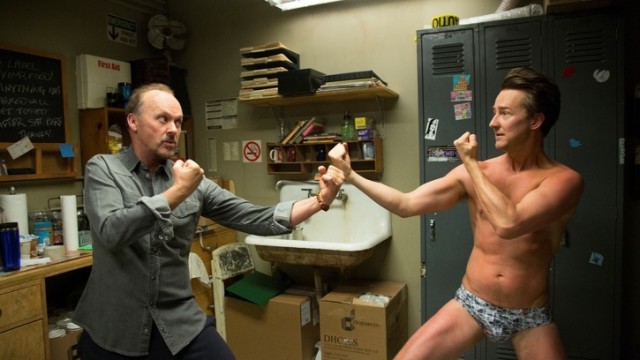Films have the power to say things of incomparable substance. Some of the greatest filmmakers of all-time have used the medium of cinema to bring to life the kind of films that help shape a generation. It’s neat to see any person undertake the mission of making a film that says something truly important, and it’s pretty obvious that director and one of Birdmans four writers Alejandro Gonzalez Inarritu truly believes with all of his heart and soul that he’s saying something meaningful. I’m sure it’s meaningful to him, and more power to him if it is. But for me, the message of the motion picture is like the movie itself; cluttered and underwhelming.
Inarritu and the other writers of the motion picture (Nicolas Giacabone, Alexand Dinelaris and Armando Bo) have a ton of stuff to say in this movie, but frankly, none of the four seem to have time to develop characters or make the various situations of the film all that compelling. They’re too busy talking about the dangers of virality, film criticism, franchises and anything else. There’s some actually potent thoughts in there (despite my occupation as such, Michael Keatons angry rant at a theater critic actually makes some potent points about the art of criticism), which makes it even more underwhelming that the rest of the films points feel more like some kind of ramble courtesy of the old man who barks for kids to get off his lawn. It all gets so tiring after a while, to the point where the film occasionally has the eloquence of a YouTube commentor in terms of subtly and effectively getting its point across.
Another problem with the script is in how it handles it’s supporting cast, and that’s a real shame considering how many talented people are in here. Edward Norton pretty much becomes the Road Runner to Michael Keatons Wile E. Coyote for much of the film, but for the last third or so of the feature, Norton inexplicably vanishes. Having spent so much time with him, it feels bizarre not to get any conclusion from him. I also wish Naomi Watts character Lesley got more screentime, as a scene where she breaks down about how long she’s wanted to be a Broadway actress shows the sort of effective vulnerability the film could use more of. Unfortunately, she gets almost nothing else to do after that, which feels like a tremendous waste to me. Emma Stone is the only one of the supporting cast to make a major impression, though even her character can get repetitive after a while.
Thankfully, the lead character, Riggan (who played the films fictional titular superhero), is played terrifically by Michael Keaton. This films rave reviews and awards buzz will surely give Keaton a much deserved comeback (that I’ll always say shoulda come with his scene-stealing turns in the summer 2010 comedies Toy Story 3 and The Other Guys, but alas, it twas not to be), and for good reason. Keaton lends real pathos to the character on an emotional and physical level, which really sends home how important a play Riggan’s written and directed mean to him. This stage production is all he has left after his celebrity days have left him behind, and Keaton makes every second of remorse count.
Much of the feature is set in the theater where that play is being performed, and having spent three years in High School theater, the film really does a great job at sending home the tight spaces that are hallmarks of theatrical productions. The environments feel lived in and compelling, no doubt an achievement from the films cinematographer Emmanuel Lubezki who makes certain moments of the feature a visual extravaganza. He and director Inarritu make a great team, and make the film a terrific hit on a visual level, but unfortunately, Birdman is bogged down by a lackluster and sloppy script that keeps the rest of the film (save for Keatons performance) from getting anywhere near that kind of success.

